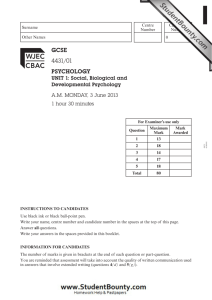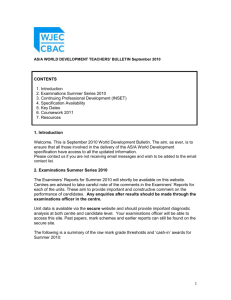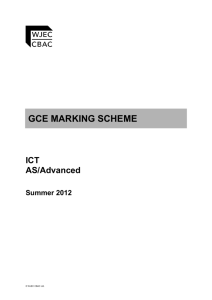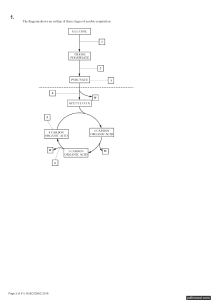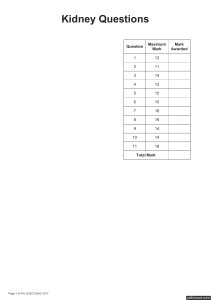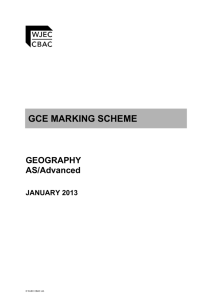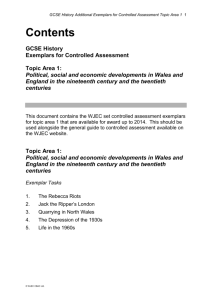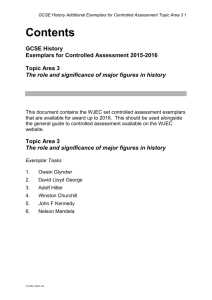Chapter 5 – Consumer Protection
advertisement
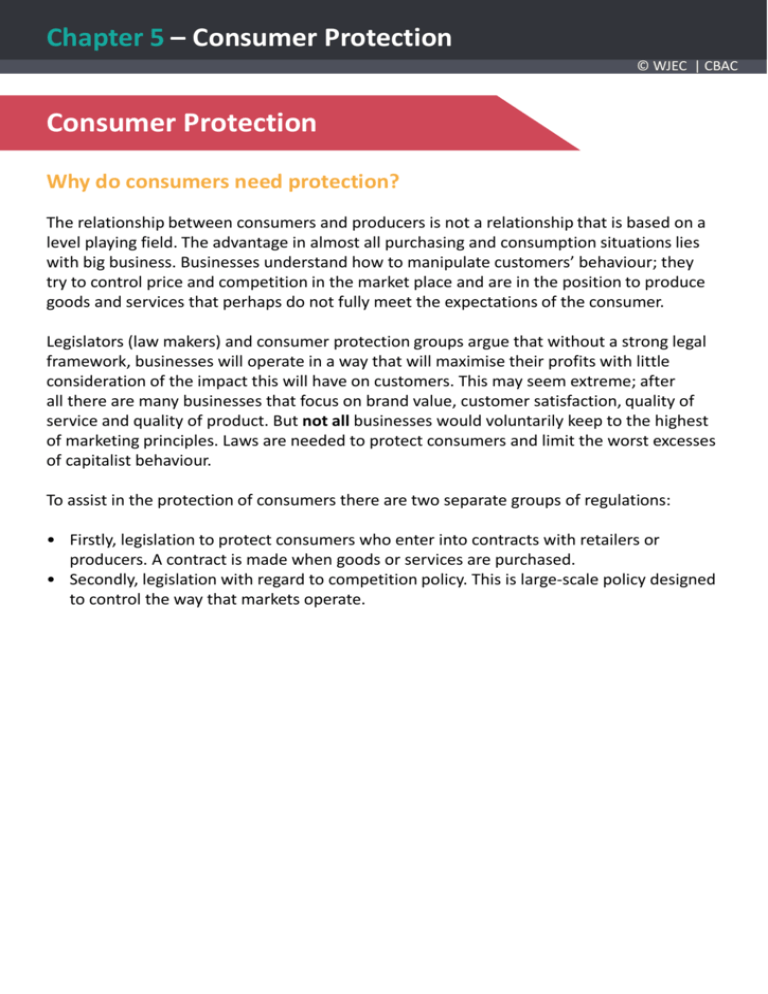
Chapter 5 – Consumer Protection © WJEC | CBAC Consumer Protection Why do consumers need protection? The relationship between consumers and producers is not a relationship that is based on a level playing field. The advantage in almost all purchasing and consumption situations lies with big business. Businesses understand how to manipulate customers’ behaviour; they try to control price and competition in the market place and are in the position to produce goods and services that perhaps do not fully meet the expectations of the consumer. Legislators (law makers) and consumer protection groups argue that without a strong legal framework, businesses will operate in a way that will maximise their profits with little consideration of the impact this will have on customers. This may seem extreme; after all there are many businesses that focus on brand value, customer satisfaction, quality of service and quality of product. But not all businesses would voluntarily keep to the highest of marketing principles. Laws are needed to protect consumers and limit the worst excesses of capitalist behaviour. To assist in the protection of consumers there are two separate groups of regulations: • Firstly, legislation to protect consumers who enter into contracts with retailers or producers. A contract is made when goods or services are purchased. • Secondly, legislation with regard to competition policy. This is large-scale policy designed to control the way that markets operate. Chapter 5 – Consumer Protection © WJEC | CBAC Consumer protection legislation As stated above, when consumers purchase goods or services, contracts are formed between the consumer and the retailer and the producer of those goods or services. To clarify the nature of these contracts and to establish the requirements of producers and retailers, a series of laws have been passed. Below are some examples of such legislation: The Sale and Supply of Goods Act 1994 states that goods must be of merchantable quality, fit for their intended purpose, lasting for a reasonable amount of time and be as described. This means that the goods must be capable of doing what they were designed to do and what the purchaser would reasonably expect them to be able to do. For example, if you purchase a new car it must be capable of reliably transporting its driver and passengers. If you purchase a computer that was described as a top-end gaming computer, and you looked at the motherboard and discovered a 200 MHz chip and no graphics card, the goods are not as described. The Consumer Credit Act 1974 controls the way that goods can be bought and sold on credit. Under this act the use of APR was established. APR is the annual percentage rate of interest – this must be clearly stated when credit is being offered. The use of APR allows consumers to easily compare competitive interest rates and to judge the true cost of borrowing. Also this act established the use of ‘cooling-off’ periods where in many cases consumers have 14 days in which they are able to change their mind about entering into a credit arrangement. The Trade Descriptions Acts 1968 and 1972 are designed to prevent and make it a criminal offence to give untrue or misleading descriptions of goods with regard to their content, size, weight and price. Because of this legislation, manufacturers and retailers have to take a great deal of care about information presented on the packaging of their goods, or within advertisements and any other form of promotional material. Distance selling regulations help protect consumers who buy over the phone or online. If businesses break these regulations then the consumer is not bound by the purchase contract. These regulations provide the consumer with a cancellation period of 14 days: the ‘cooling off’ period during which consumers are entitled to change their minds and cancel the contract and receive a full refund, regardless of whether the product is defective. Also consumers are not bound by charges they have not expressly agreed to – such as hidden delivery or card payment costs. Chapter 5 – Consumer Protection © WJEC | CBAC The role of the ombudsman However, retailers and consumers still find issues to dispute. If a customer has a complaint that in their view has not been satisfactorily dealt with by the business concerned the next step in finding redress might be the Ombudsman Service. The Ombudsman Service can be used to complain if consumers have an issue with pricing, quality of service, quality of goods or mistreatment. In a number of industries, including financial services, communications (e.g. phones and the internet), energy (e.g. gas and electricity), and property (e.g. estate agents and surveyors) the ombudsman findings are binding and the business concerned must comply with the ruling. The Competition and Markets Authority (CMA) Consumer protection legislation is fully enforced by the courts, but to further assist the consumer there are various organisations to help ensure that the law is abided by. On a national basis, The Competition and Markets Authority (CMA) works to encourage the establishment of voluntary codes of practice within industries. For example, ABTA (Association of British Travel Agents) and ATOL (Air Travel Organisers’ Licensing) protect and reimburse holidaymakers if their travel company ceases trading (if the company is a member). The CMA will also advise the government when it believes that new legislation is required. On a local basis, Trading Standards Departments and Environmental Health Departments work to help ensure obedience to the legislation. For example, Trading Standards officers are often found touring markets and car boot sales checking for sales of counterfeit goods. Legislation with regard to competition policy Competition policy is focussed upon controlling the power of big business. If businesses in a monopoly or near monopoly are able to hold a dominant market position, then they are likely to have control over price or the amount produced within the market. Governments (UK and EU) will therefore put in place laws and regulators to limit the potential abuse of market power and thereby protect consumers. In April 2014 the Competition and Markets Authority (CMA) replaced the Competition Commission and most of the roles of the Office of Fair Trading. One role of the CMA (see text box) is to examine situations where companies act together, forming an illegal cartel to limit the competition within an industry. Businesses, if they have a choice, will not compete on price and they may take the view that by creating a dominant Chapter 5 – Consumer Protection © WJEC | CBAC market position by working with other large businesses, they can limit price competition. Because of the potential of cartels and collusion between businesses, legislation allows for guilty parties to be fined up to 10% of turnover for each year of illegal activity. Role of the CMA • • • • • • . investigating mergers which could restrict competition conducting market studies and investigations in markets where there may be competition and consumer problems investigating where there may be breaches of UK or EU prohibitions against anti-competitive agreements and abuses of dominant positions bringing criminal proceedings against individuals who commit the cartel offence enforcing consumer protection legislation to tackle practices and market conditions that make it difficult for consumers to exercise choice co-operating with sector regulators and encouraging them to use their competition powers Chapter 5 – Consumer Protection © WJEC | CBAC Ethical issues related to consumer protection Apart from legal considerations, businesses also need to consider the ethics of their relationships with customers. Consumers can be manipulated by businesses and their marketing professionals. Subliminal advertising (placing fleeting or hidden images in films or TV programmes in the hope that viewers will process them unconsciously) was banned in the 1970s, but that does not stop the unscrupulous from taking advantage of natural human reactions. Product placement is when a company pays a TV channel or a programme-maker to include its products or brands in a programme. This is allowed but there are rules from Ofcom (the broadcasting regulator) on how this is done. For example, no product placement can be carried out on children’s tv programmes and certain products such as cigarettes and alcohol are not allowed. It used to be standard for all supermarkets to have displays of sweets and chocolates next to checkouts: children would use ‘pester power’ to get their parents to buy sweets whilst they queued. It was only as a result of customer pressure that these displays have been changed to now display less impulse purchase items instead – offering items such as batteries, laces and breath-freshening mints. This change by supermarkets to a more ethical stance is not seen in all consumer markets – it is quite usual for businesses to target expensive brands at children and teenagers. Can it be ethical for businesses to convince children that the only pair of trainers worth having costs £70? With cigarette smoking declining in developed countries is it right that the major tobacco businesses should discount their prices to win customers in developing countries? Being ethical in marketing is always a problem area for those businesses producing and marketing consumer products. It can be a difficult balancing act for businesses to try to maximise sales whilst at the same time marketing their products in a way that does not encourage overconsumption or excessive behaviour by customers. Some businesses have had to try to reinvent themselves because their marketing has been seen as unethical. McDonalds ‘supersize’ was once a marketing winner, but with increased worries about people’s weight problems, the campaign was dropped. McDonalds now focus a large part of their advertising and product development on healthier meals. Chapter 5 – Consumer Protection © WJEC | CBAC BBC news article on a record fine for price-fixing: http://news.bbc.co.uk/1/hi/business/2779777.stm Activities Which organisation now carries out the roles of the Office of Fair Trading? Discussion themes Explain the industry factors that allowed the price-fixing to occur. Should ethics be part of a business’s marketing approach? Discuss the following statement: ‘With so much choice available, consumers are capable of looking after themselves.’ Ofcom rules on product placement: http://consumers.ofcom.org.uk/tv-radio/ television/product-placement-on-tv/ Read the rules on product placement. Do you think it is in the best interests of UK consumers that Ofcom control the use of product placement on TV?

